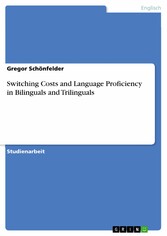Suchen und Finden
Switching Costs and Language Proficiency in Bilinguals and Trilinguals
Studienarbeit aus dem Jahr 2013 im Fachbereich Anglistik - Linguistik, Eberhard-Karls-Universität Tübingen, Sprache: Deutsch, Abstract: As our world becomes more and more globalised, the number of people who speak more than two languages increases, thus making research into trilingualism an attractive enterprise in order to see what the effects of three languages in one mind might be. In recent years, there has been an increase in studies investigating, amongst other aspects, cross-linguistic influences on third language acquisition or word recognition in trilinguals. However, in general, such research is still relatively scant. Trilingualism is often seen as merely a special case of bilingualism and most of the findings for bilingualism have been regarded as extendable to trilingualism, often not even making a distinction between bilingualism, trilingualism, and multilingualism in general. Some studies have tried to determine whether trilinguals have special competences that bilinguals have not, yet without conclusive results. Yet, it would be very interesting to know whether or not trilingualism is really just 'bilingualism plus one', i.e., the findings regarding lexical access for bilinguals extend to trilinguals. This paper will investigate whether the findings for switching costs for bilinguals' two languages extend to trilingualism, and to what extent these costs are influenced by language proficiency. In a first step, some general concepts and methods relevant for the papers discussed here will be reviewed. In chapter 2, two studies dealing with the issue of switching costs in bilinguals and trilinguals, respectively, will be presented and compared. In the final chapter, I will try to answer my research questions, but also to touch on alternative accounts for the findings presented here.
Alle Preise verstehen sich inklusive der gesetzlichen MwSt.











